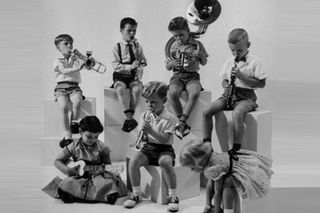
In Indian Schools, Music Education Focuses on Stress Relief, Not Skills
Resources, attitudes get in the way of music being a full-fledged field of study.

In Medha Sahi’s classroom, you might hear the six beats of taal daadra playing over a Western waltz.
“We try to make music as fun as possible, but there is a certain element of seriousness,” Sahi said. “For younger kids, it’s a lot about music exposure, as well as what is pitch, what is a high sound, what is a low sound.”
Sahi teaches music to pre-nursery through Class 3 students at two elite Mumbai schools via The Sound Space, a music education organization.
“Culturally, Indian education sometimes fail to recognize the importance of Arts in the education of a child. But I think that’s rapidly changing,” she said. “[School administrators] have been extremely supportive of it, especially near Annual Day time, because that’s a big part of Indian education, and it often includes a lot of music.”
In the Indian school system at-large, music education is virtually non-existent. “Most of the schools do not have music education as a part of their academic or extra-curricular activities,” writes music researcher Vishal, PhD, on findings derived from his work on a comparative study of music education curricula in Indian and New Zealand schools for UNESCO. “It was observed that most of the schools do not have a music department/ music teacher/instructors to teach music to their students.”
In schools that do, the report finds, music is an optional course, not universally available to all class levels, with an outdated, low-tech curriculum that provides no encouragement to see career-potential in the field.
“During discussion with students it was observed that they are aware of very few career options in music,” writes Vishal.
Schools typically see music as an early-age teaching method, rather than an educational subject in its own right. “[The Arts] are viewed as a means of making the basic subject areas of language, mathematics and environmental studies comprehensible to the child,” notes an upper primary music curriculum by NCERT, the National Council of Educational Research and Training.
Or as a means to a spectacular Annual Day. “Many schools do invite professionals to help their students to perform well [but] only during some events and occasions, not before and after,” Vishal said in an interview.
Often, it boils down to a matter of resources. In a society with a 74% literacy rate and chronically underfunded schools, the trade-off between investing in basic math and reading lessons versus music is clear.
“Many schools do not have adequate resources for music teaching and learning and some schools do not have even basic resources to support music education,” Vishal said.
But it’s also linked to attitudes about how music is taught.
Traditionally, studying music was only available to a small number of people. “You have you get an opportunity to learn because it was all master-disciple things,” said Hridaya Kakati, a music teacher at Swadhyay Bhavan School in Matunga, Mumbai. “So the master has to accept you as the disciple … if your parents are allowing, your background and everything. So, it was little difficult.”
And attitudes about what music can — or can’t — do for students.
“Parents today seem to be only concerned with high mainstream test scores instead of identifying, in addition, the creative capabilities and talents of their children. Consequently, students, too, seem to be subliminally participating in rat race rather than recognizing their own instinctive talents and creative potential,” Vishal said. “I think parents are willing for their kids to learn music but more worried about their secured career, which music industry may not provide.”
Ironically, the academic rat race may be what gets music a foot in the door. Academic pressure is a growing concern for parents, amid recent reports that one Indian student commits suicide very hour, and they may see music lessons as a way for children to manage their stress.
“People are so stressed out they don’t know what to do. but the people who have art in their life, they’re more happier,” said Kakati. “The emotional aspect is very much lost in our education system. We don’t know what we are trying to give to our children. These things are important. Music and yoga, all these things are important for all round development.”
“As a child, especially in a high-stress academic environment, having a break in which one is creating and participating and being enhances a child’s life no matter what, no matter what their level of giftedness is,” Sahi said.
Ironically, music education — not as a method of stress relief, but as a field — fosters the very skills children will need to thrive in the rat race. Recent research has found musical training enhances language processing skills in kindergartners. Other research has linked musical training to improved math abilities, reading comprehension, and better executive function (skills such as self-restraint, planning and time management), though it is unclear if music is the cause, or if the skills and activities are mutually reinforcing.
These skill benefits aren’t common knowledge outside of elite schools and policy spheres, which may explain broader attitudes that value music, but only as a method or hobby. Vishal said it’s on researchers like himself to make compelling, research-based arguments for including music in regular schools to all stakeholders, as well as to advocate for a curriculum that exposes children to the diversity of musical careers, beyond guru.
“First change I would like to see is a revised curriculum updated with the contents to introduce new areas, i.e. instruments making, cultural research, cultural journalism, music production, event management, et cetera,” he said, “along with the classical music and local, specific, culture-based music, to widen the scope of learning and scope of career for music students.”
This evolution in curriculum might be what it takes to place music on the same footing as traditional academic disciplines, and help grow an important, budding industry — thus dispelling the myth there are no career opportunities in music. But it also runs the risk of adding music to the academic and professional rat race, a turn of events Sahi would be sad to see.
“One of the greatest gifts [of music education] is to explore how the child feels, not how well they perform,” she said.
Related:
Liesl Goecker is The Swaddle's managing editor.
Related


Families Are Moving to Goa to Give Their Kids Better Air
